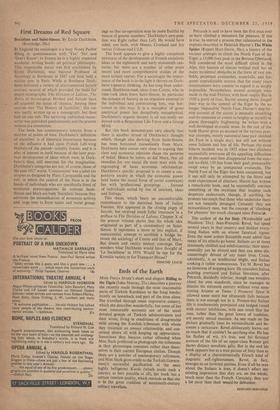Ends of the Earth
MISS FREYA STARK'S short and elegant Riding to the Tigris (John Murray, 21s.) describes a journey she recently made through the most inaccessible parts of Turkish Kurdistan to the Iraqi border, mostly on horseback and part of the time alone. She travelled through some impressive country, which she describes wonderfully, but some of her most memorable accounts are of the small devoted groups of Turkish administrators and their wives, living in conditions of disagreeable exile among the Kurdish tribesmen with whom they maintain an uneasy relationship, and con- cerned above all with keeping up appearances. Sometimes they became rather offended when Miss Stark preferred to photograph the tribesmen in their picturesque costumes rather than them- selves in their correct European clothes. Though there are a number of contemporary references, and Miss Stark gives credit to the Turkish Govern- ment's successful pacification of the once highly belligerent Kurds (which made such a journey as hers possible at all), her book has a certain timeless quality, which reminds us that she is in the great tradition of nineteenth-century solitary travellers. Petrarch is said to have been the first man ever to have climbed a mountain for pleasure. If this is true, he started a process that culminated in the exploits described in Heinrich Harrer's The White Spider (Rupert Hart-Davis, 30s.), a history of the various attempts to climb the North Face of the Eiger, a 13,000-foot peak in the Bernese Oberland. Still considered the most difficult climb in the Alps, this bastion of almost vertical rock has so many incidental obstacles in the form of vast ice- fields, perpetual avalanches, waterfalls, and fre- quent unpredictable storms, that for many years mountaineers were content to regard it as simply impossible. Nevertheless, several attempts were made in the mid-Thirties, with fatal results. But in 1938 a party of four, Harrer among them, fought their way to the summit of the Eiger by the no longer impossible' North Face. Harrer's step-by- step account of the ascent is intensely absorbing and (to someone as averse to heights as myself) in places thoroughly frightening: he writes with a well-developed dramatic sense. In the rest of the book Harrer gives an account of the various post- war attempts, mostly successful (one pair climbed the Face in a single day), but still not without some failures and loss of life. Perhaps the most bizarre incident was in 1953 when two climbers successfully overcame all the appalling difficulties of the ascent and then disappeared from the sum- mit ice-field, 150 feet from their goal, presumably swept away by an unexpected avalanche. The North Face of the Eiger has been conquered, but it can still only be attempted by the fittest and most experienced of climbers. Harrer has written a remarkable book, and he successfully conveys something of the mystique that inspires such desperate endeavours, though, if anything, he protests too much that those who undertake them are not mentally deranged. Certainly they are extraordinary men, but the concept of 'climbing for pleasure' has much changed since Petrarck.
The author of As for Italy (Weidenfeld and Nicolson, 21s.), Jean-Francois Revel, has spent several years in that country and dislikes every- thing Italian with an almost fanatical rigonr. Even the most ardent ltalophile must admit that many of his attacks go home. Italians are at times tiresomely childish and exhibitionistic; their senti- mentality can be absurd and they can seem dis- concertingly devoid of any inner lives. Croce, admittedly, is an intellectual blight, and Italian cooking is rather monotonous. Yet M. Revel has no intention of stopping here. He considers Italian painting overrated and Italian literature. after Petrarch, decidedly inferior, though one wonders about his own standards, since he manages to dismiss the sixteenth century without even men- tioning Ariosto or Tasso. 1 Protnessi Sposi is allowed some merit but ultimately fails because there is not enough sex in it. Present-day Italian life is irredeemably provincial and hedged round with sinister inhibitions, with one result that the men, rather than the great lovers of tradition, are merely sexual maniacs. As one reads on the picture gradually loses its verisimilitude and be- comes a caricature: Revel deliberately leaves out so much that it couldn't be anything else. He has his flashes of wit, it's true, and his fictional account of the life of an upper-class Roman girl shows distinct novelistic gifts. But in the end his book appears less as a true picture of Italy than as a display of a characteristically French kind of dogmatic self-righteousness. Revel, in fact, emerges as an inverted puritan. Even if all he says about the Italians is true, it doesn't affect my existing impression that they are, on the whole, much nicer than the French. Certainly, they are a lot nicer than their would-be debunker.
BERNARD BERGONZI


























 Previous page
Previous page